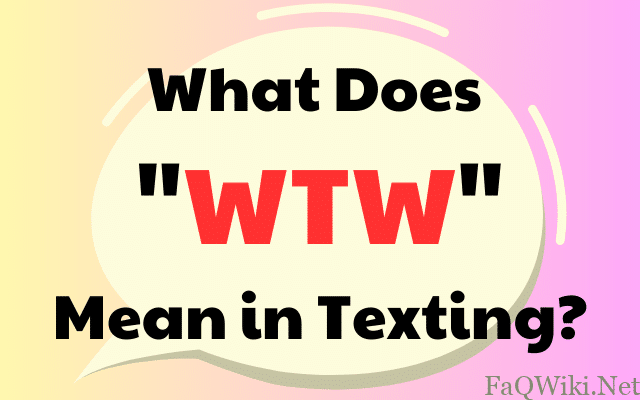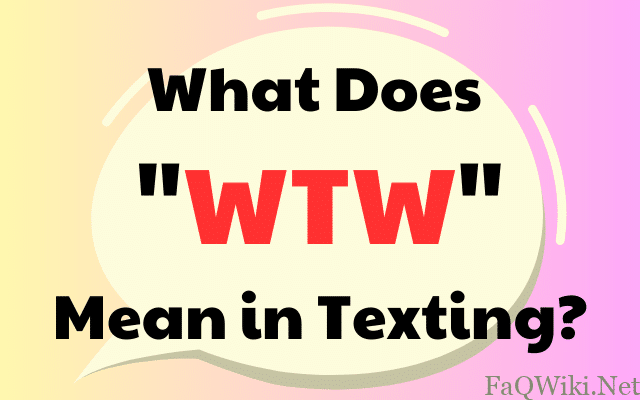What Does WTW Mean in Texting: Understanding the Popular Internet Slang

Introduction
Internet slang is a ubiquitous part of online communication, with new terms and acronyms popping up all the time. One of the most commonly used internet slang terms is “WTW.” But what does WTW mean, and where did it come from? In this article, we’ll explore the meaning and history of WTW, its proper usage, and its impact on language and communication.

What Does WTW Mean?
WTW stands for “what’s the word?” It is a question used to ask someone for news or updates about a situation. WTW is a shorthand way of asking for information in a casual and informal manner.
In texting and online conversations, WTW is often used to start a conversation or to catch up with someone. For example, you might text a friend, “WTW? How’s your day going?”
The Origin and History of WTW
Internet slang has evolved over time, with new terms and acronyms being created to fit the needs of online communication. The exact origins of WTW are unclear, but it is thought to have emerged in the early days of instant messaging and online chat rooms.
As social media and texting became more popular, so did the use of WTW. Today, WTW is a common phrase used in online conversations and social media platforms.
How to Use WTW
WTW is a casual and informal way of asking for news or updates. It is typically used in personal conversations and is not appropriate for formal or professional settings.
When using WTW, it’s important to keep in mind the context of the conversation. WTW is typically used to initiate a conversation or to catch up with someone. It can also be used to check in on someone after a period of time has passed.
Here are some examples of how to use WTW in different situations:
- “Hey, haven’t talked to you in a while. WTW? How’s life treating you?”
- “WTW with the new job? How’s the first week been?”
- “I heard you went on vacation last week. WTW? Any good stories to share?”
Other Meanings of WTW
While “what’s the word?” is the most common interpretation of WTW, there are other possible meanings depending on the context of the conversation. For example, WTW can also stand for “want to watch” in certain situations, such as when discussing a movie or TV show.
It’s important to be aware of these different interpretations of WTW to avoid confusion in conversations.
The Importance of Understanding Internet Slang
Internet slang is a rapidly evolving form of communication that can be difficult to keep up with. However, understanding internet slang is important for effective communication in online spaces.
Using internet slang correctly can help you connect with others and convey your message more effectively. On the other hand, using internet slang incorrectly can lead to confusion and miscommunication.
WTW in Social Media
WTW is commonly used on social media platforms such as Twitter, Instagram, and Facebook. In these contexts, WTW is often used to start a conversation or to catch up with someone.
For example, you might tweet, “WTW, Twitterverse? Does anyone have any good book recommendations?”
The Positive and Negative Effects of Using Internet Slang
The use of internet slang, including WTW, has both positive and negative effects. On the positive side, internet slang can be a way to express yourself creatively, form connections with others, and keep up with the rapidly evolving landscape of online communication.
On the negative side, the overuse of internet slang can lead to a lack of clarity and professionalism in online conversations. Additionally, the constant creation of new slang terms can make it difficult for people to keep up with the latest trends and meanings.
Best Practices for Using WTW and Other Internet Slang
If you decide to use internet slang, including WTW, it’s important to use it in a way that is appropriate and effective for the context of the conversation. Here are some best practices to keep in mind:
- Understand the meaning: Before using WTW or any other internet slang term, make sure you understand its meaning and appropriate usage.
- Consider the context: Make sure the use of internet slang is appropriate for the context of the conversation. Internet slang may not be appropriate in professional or formal settings.
- Avoid overuse: Overusing internet slang can make your communication seem unprofessional or difficult to understand. Use it sparingly and in appropriate situations.
- Be aware of different interpretations: Internet slang can have multiple interpretations depending on the context of the conversation. Be aware of these potential interpretations to avoid confusion.
Conclusion
In conclusion, WTW is a common internet slang term used to ask for news or updates about a situation. It has its origins in early instant messaging and online chat rooms, and is now widely used in social media and texting.
While internet slang can be a useful tool for online communication, it’s important to use it appropriately and with consideration for the context of the conversation. By understanding the meaning and appropriate usage of WTW and other internet slang terms, you can effectively communicate with others in online spaces.
FAQs
Q: Is WTW only used in texting?
A: No, WTW can also be used on social media platforms like Twitter, Instagram, and Facebook.
Q: What are some other internet slang terms I should know?
A: Some other commonly used internet slang terms include LOL (laugh out loud), BRB (be right back), and IMO (in my opinion).
Q: Can internet slang be used in professional settings?
A: It’s generally not recommended to use internet slang in professional or formal settings, as it can come across as unprofessional or immature.
Q: How can I keep up with the latest internet slang trends?
A: Following social media influencers and staying active on social media platforms can help you stay up-to-date on the latest internet slang trends. You can also check online resources and dictionaries dedicated to internet slang.
